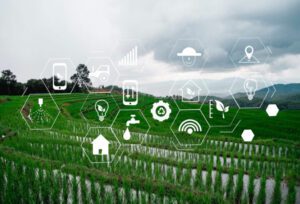Last updated on August 1, 2025
When I first started talking to farmers about “the cloud” a few years back, I’d often get a blank stare. “Are we talking about the actual clouds that bring rain?” someone once joked. It was a fair question! Managing a physical farm with something intangible felt like science fiction. But fast forward to today, and that conversation has completely flipped. Imagine a Nigeria where hunger is rare, food waste is minimal, and our farmers don’t just survive, they thrive, even as the climate shifts. This isn’t some far-off dream—it’s the very real future of Nigerian agriculture, powered by smart technology.
This guide is about that future: real empowerment, serious boosts to our food security, and laying the groundwork for a truly resilient nation by giving our agricultural backbone the modern tools it deserves.
The Core Challenge: Why Nigerian Agriculture Urgently Needs Technology
Okay, so before we jump into solutions, we’ve gotta get a clear picture of the problem. What exactly are we up against? Nigeria’s farming heartland, vibrant as it is, grapples with deep-seated issues. Frankly, technology is uniquely positioned to untangle them.





Some of these issues, honestly, feel like they’ve been with us forever. Isn’t it about time we tried something genuinely different?
Why Are Yields So Low and Food Insecurity So High?
Just think: Nigeria is Africa’s most populous nation, and its population is booming. Yet, our farms often produce far less per hectare than farms elsewhere. This low productivity boils down to heavy reliance on traditional, incredibly labor-intensive methods, a frustrating lack of access to genuinely improved seeds, and simply inefficient land use.
This doesn’t just pinch a farmer’s wallet. It hits hard at food security, making basic staples expensive and, sometimes, downright scarce for far too many families.
I still vividly remember a visit to a small farm in Ogun State a few years back. The farmer there was using hand tools across vast stretches of land. It struck me then: sheer human effort, no matter how dedicated – and he was dedicated, truly – simply couldn’t keep pace with what modern life demands.





It really makes you pause, doesn’t it? Just imagine the leaps we could make if every farmer had a proper tech-powered helping hand.
Why Do We Lose So Much Produce After Harvest?
Oh, this one’s a real kick in the gut for anyone connected to agriculture. All that sweat, all that toil cultivating crops, only for a huge chunk – sometimes a staggering 40-50% for perishables, according to reports from the Food and Agriculture Organization (FAO) – to spoil before it even reaches the market. It’s just… a tragedy.
This monumental waste of effort and resources happens because of storage that isn’t up to scratch, transportation nightmares, and supply networks that are, well, let’s just say disorganized.
Picture this: a farmer brings in an amazing harvest of tomatoes, but then half of it rots right there because they can’t sell it fast enough. That’s lost income, good food gone bad, and a massive contribution to our food waste problem.



You feel that pang of frustration, don’t you? Thankfully, technology, as we’re about to explore, offers some vital ways to plug these very costly leaks in the supply chain.
How Is Climate Change Impacting Our Farms?
Our climate? It’s not just changing, it’s acting up. Farmers are truly on the bleeding edge of this. We’re seeing rainfall patterns that are completely out of whack, long, painful droughts in some areas, and then devastating floods hitting others. It’s a constant, unpredictable test of resilience.
Beyond the weather’s wild swings, there’s also soil degradation from continuous farming without proper nutrient management, plus inefficient water usage that just compounds everything.
This all screams for urgent, smart solutions that promote climate-resilient farming practices. We simply can’t just cross our fingers and hope for the best anymore, can we? That’s not a strategy.




Are Farmers Getting the Information They Need?
Knowledge is power, sure, but for many Nigerian farmers, especially the smallholders, crucial, timely information is frustratingly out of reach. They’re often operating without real-time weather forecasts, without a clue about current market prices for their produce, or even up-to-date alerts on pest outbreaks and the very best farming practices.
This “information gap” forces them into decisions based on pure guesswork, or — worse — outdated methods. That, in turn, skyrockets their risks and severely caps their potential yields. It’s a bit like trying to bake a complex cake without a recipe or knowing what ingredients you actually have on hand – you might whip up something, but probably not what you truly intended!
Why Is Access to Finance and Markets Still So Hard?
Access to credit? Oh, that’s a bottleneck that just won’t quit. Smallholder farmers, who are absolutely the backbone of Nigerian agriculture, often sweat blood trying to get loans or the investments they desperately need for better seeds, fertilizers, or even just some basic modern equipment.
And on top of that, traditional market channels can feel pretty exploitative. Middlemen often snatch a disproportionately large slice of the profits, leaving farmers with pretty meager returns.





This whole lack of financial muscle and direct access to decent markets, well, it keeps far too many trapped in a cycle of subsistence farming. It’s a truly tough spot, and it can be incredibly, soul-crushingly frustrating for those trying their absolute best to break free.
Read more on how technology can improve agriculture in Nigeria.
The Game-Changing Benefits of Agritech
Why consider these tools? They offer a powerful trifecta: efficiency, increased yields, and consistent cost savings. Sounds like a farmer’s dream, right? And honestly, it often feels exactly that way when things run smoothly.
How Can Cloud Tools Boost My Farm’s Efficiency and Productivity?
Cloud-based systems streamline farm operations, making management smoother and more organized. Coordinating everything—from planting to maintenance—is a huge farmer headache. Cloud-based systems act like a super-organized, unpaid farm manager, making it a sweet deal.




How Do Cloud Tools Streamline My Operations?
- Precisely know optimal planting windows.
- Track every input used.
- Monitor crop growth stage-by-stage.
These tools take guesswork out, making things smoother. No more “I think we planted that field last Tuesday…” guesses!
Can Cloud Tools Automate Task Management & Optimize Labor?
My cousin in Iowa used to spend hours manually assigning tasks. Now, platforms let him digitally assign tasks, track real-time progress, and get instant updates.
This frees him for critical decisions, not micromanaging. It’s a huge relief for him and his crew.
How Does Real-Time Monitoring Enable Proactive Farming?
Real-time monitoring provides instant alerts, enabling farmers to prevent issues before they escalate.



- Sensors, drones, and satellite imagery feed data to your dashboard.
- If soil moisture drops or pests emerge, you get an alert now.
Being proactive prevents headaches. Farmers catch nutrient deficiencies weeks before crop devastation—that’s the “aha!” moment these tools create.
How Do Cloud Tools Boost Yields and Crop Health?
Cloud tools enhance precision, helping farmers maximize yields and maintain optimal crop health. Ultimately, it’s about what you harvest. These tools help you squeeze more from every acre, often pleasantly surprising you.
How Do Cloud Tools Enhance Precision Inputs (Water, Nutrients, Pest Control)?
Smart farming shines here. Cloud tools, with variable rate tech, apply water, fertilizer, or pesticides only where and when needed.
This is efficient and effective for plant health. No more wasting expensive fertilizer!

Can AI & Sensors Help with Early Detection of Issues?
My friend, an agronomist I know well, recently showed me how an AI-powered system flagged a cornfield’s nutrient deficiency weeks before it was visible.
That early warning saved the crop. This is the power of these tools—they see what we can’t.
How Do Cloud Tools Support Data-Driven Decisions for Optimal Growth?
The volume of data is overwhelming, but AI and analytics turn it into actionable insights.
Decisions on planting, irrigation, or harvest timing become less about gut feeling and more about data.
It supercharges your experience with evidence-based facts.
What Are the Cost Savings & Resource Optimization Benefits?
Agritech tools deliver significant cost savings through reduced waste and optimized resource use. Every penny counts. These tools often pay for themselves through reduced waste and improved efficiency.
How Do Cloud Tools Help Reduce Waste (Water, Fertilizer, Chemicals)?
Precision application means no over-applying expensive inputs.
A University of Nebraska-Lincoln study indicated precision nitrogen application can reduce fertilizer costs by an average of 12%. That’s significant savings.
Imagine what you could do with that extra money!
Can Cloud Tools Help with Smart Budgeting and Financial Tracking?
Many cloud platforms include robust financial modules.
- Track expenses, manage inventory, and project profits with greater accuracy.
This helps you see where money goes and where to tighten belts, bringing immense peace of mind.
How Do Cloud Tools Improve Equipment Utilization and Maintenance?
Ever had equipment break down at the worst time? Predictive maintenance, fueled by machine data, alerts you to issues before costly failures.
This keeps valuable assets running smoothly, avoiding painful budget-busting surprises.
How Do Cloud Tools Enhance Sustainability and Environmental Stewardship?
These tools help farmers minimize their ecological footprint and meet compliance requirements, fostering sustainability. It’s not just profit; it’s being a good land steward. It adds meaningful satisfaction.
Minimizing Ecological Footprint:
Optimizing water and reducing chemical runoff through precision application helps you farm responsibly.
This is important for consumers and regulators. It’s a win-win.
Meeting Compliance and Regulatory Requirements:
Record-keeping becomes a breeze with automatically logged data.
Easily demonstrate compliance with environmental regulations or organic certifications. No more frantic scrambling for audits!
The Top 10 Innovations Shaping Nigerian Agriculture
Here are the specific technologies actively reshaping farming and delivering concrete solutions to Nigeria’s agricultural challenges.
- Precision Agriculture & GNSS: This is about using data to make farming surgically precise. Technologies like the Global Navigation Satellite System (GNSS) and GPS guide tractors for exact planting and fertilizing, eliminating waste. A maize farmer in Kaduna reported a 20% savings on fertilizer and a 35% yield increase using precision tools.
- Smart Irrigation & IoT Sensors: To combat water scarcity, smart irrigation uses Internet of Things (IoT) sensors buried in the soil to measure moisture and temperature. This data automates irrigation, delivering water only when and where it’s needed. Farmers in Kano using this tech have cut water usage by half while doubling harvests.
- Explore further: What Sensors Are Used in Smart Irrigation Systems?
- Agricultural Drones: Drones are a farmer’s eyes in the sky. They can scan vast fields to identify pests, diseases, or water stress, and even spray crops with pinpoint accuracy. A farmer in Ogun State reported covering 50 acres in less than an hour for pest control, a task that would take days manually.
- Satellite Imagery & Remote Sensing: Satellites provide a bird’s-eye view of farms, using analyses like NDVI (Normalized Difference Vegetation Index) to assess plant health from space. This allows farmers to spot widespread problems like nutrient deficiencies or irrigation issues early, before they become catastrophic.
- AI, Machine Learning & Predictive Analytics: AI acts as the brain, processing data from all other tools to provide actionable insights. It can create hyper-accurate weather forecasts, predict pest outbreaks, and forecast crop yields, allowing farmers to make proactive, data-driven decisions.
- Farm Robotics & Autonomous Machinery: Self-driving tractors, robotic harvesters, and AI-powered weeding robots are revolutionizing farm efficiency. These machines handle repetitive, labor-intensive tasks with incredible precision, reducing reliance on manual labor and minimizing human error.
- Dive deeper: How to Automate Your Farm with Agritech Tools
- Digital Platforms & Mobile Apps: In a country with high mobile penetration, platforms like Thrive Agric and Farmcrowdy are game-changers. They connect farmers directly to funding, fair markets, and real-time agricultural advice, bridging the critical information and finance gaps.
- Biotechnology & Climate-Smart Crops: Biotechnology is developing crop varieties specifically suited for Nigeria’s challenges. These “climate-smart” seeds are bred to be resistant to drought, heat, and local pests, ensuring more stable and predictable harvests even in a changing climate.
- Blockchain for Supply Chain Traceability: Blockchain creates a transparent and secure digital record of a product’s journey from farm to consumer. This builds trust, allows for quality verification, and helps farmers earn higher prices. Cocoa farmers in Ondo State have seen a 20% increase in international sales using blockchain to certify their organic practices.
- Modern Mechanization: The shift from manual labor to machine power is fundamental for increasing productivity. The use of modern tractors, precision seeders, and combine harvesters dramatically increases the speed and scale of farming operations while reducing post-harvest losses.
Top Picks: The Best Farm Management Software & Tools for 2025
To help you navigate the myriad of options, we’ve compiled a selection of the best cloud-based farming tools for 2025, known for their industry buzz, farmer feedback, and technological advancements. These tools integrate various innovations discussed earlier, offering solutions for comprehensive farm management, precision crop care, smart irrigation, livestock management, and financial tracking.
For a comprehensive breakdown and detailed reviews of each platform, including their unique selling propositions, pricing insights, and a comparison table, explore our dedicated guide: The 10 Best Farm Management Software & Tools for Nigerian Farmers in 2025.
How to Choose the Right Agritech Tools for Your Farm
The sheer number of options can feel overwhelming. To cut through the noise, start with an honest understanding of your needs and priorities. Don’t fall for shiny objects; focus on your farm.
Assessing Your Farm’s Unique Needs and Goals:
Before demoing software, ask yourself:
- Farm Size and Type (Small, Medium, Large; Crops, Livestock, Mixed): A hobby farm’s needs differ vastly from a commercial operation. Some tools suit specific farming types better. Don’t force a square peg into a round hole.
- Specific Pain Points You Want to Solve: Struggling with yield predictions, water usage, or labor? Identify your biggest headaches. This narrows tools to those addressing your issues. Why invest if it doesn’t solve a real problem for you?
- Budget Considerations: Be realistic about initial investment and ongoing fees. Factor in ROI from increased efficiency. Sometimes, a higher upfront cost leads to massive long-term savings.
Key Features to Prioritize When Selecting Cloud-Based Farming Tools:
Once you know your needs, look for these critical features. This is your checklist to avoid buyer’s remorse.
- Data Integration and Centralization: Can the platform seamlessly pull data from existing equipment, weather stations, and other sources? A unified dashboard is powerful. You don’t want to log into five systems for one answer.
- Ease of Use and User Interface: This cannot be overstated. If clunky or confusing, people won’t use it. Prioritize clean designs and a low learning curve. If you groan opening it, it’s not right.
- Mobile Accessibility and Offline Capabilities: The field is often the office. Ensure easy access and data input on mobile, even with spotty internet. Non-negotiable for many rural operations.
- Scalability and Customization Options: Will it grow with your farm? Can it customize to your fields, crops, or livestock? You want adaptability for your farm’s evolution.
- Customer Support and Training Availability: What support is offered? Responsive help desk? Comprehensive tutorials? You will have questions, and you’ll want quick answers.
- Robust Data Security Measures: Ask about encryption, backup, and privacy policies. You need to trust them implicitly with your farm’s digital brain.
Asking the Right Questions Before You Invest:
This is your due diligence checklist. Be thorough—it’s your money and farm on the line.
- Compatibility with Existing Equipment: This is often a deal-breaker. Does the software integrate smoothly with your specific tractors, sprayers, or sensors? Crucial to avoid headaches.
- Trial Periods and Demos: Most reputable providers offer free trials or demos. Take full advantage! Test the software with your data to get a feel for it. Like test-driving a truck before buying.
- Customer Reviews and Case Studies: What are other farmers saying? Look for independent reviews and relevant case studies. Hearing from someone who’s “been there, done that” is invaluable.
Overcoming the Barriers to Technology Adoption
While the potential of agritech in Nigeria is immense – truly immense – we simply cannot afford to ignore the hurdles. Implementing these cutting-edge solutions isn’t as simple as just flipping a switch.
How Do We Address Infrastructure Gaps?
This is a monumental challenge. Many, many rural farming communities just plain lack reliable internet connectivity or even consistent access to electricity. How on earth are farmers supposed to use smart sensors or mobile apps if they can’t get online or even charge their devices? It’s a genuine head-scratcher, a frustrating chicken-and-egg problem.
The solutions, unfortunately, demand significant, concerted investment in rural infrastructure. We’re talking satellite internet services, solar-powered community hubs, and a determined effort to expand the national grid into remote areas. Initiatives like the National Broadband Plan aim to address connectivity, and projects promoting solar mini-grids are making strides in bringing power to off-grid communities.
“The uptake of digital agriculture in Nigeria remains relatively low due to several bottlenecks, chief among them are the limited digital infrastructure, poor connectivity in rural areas, and low digital literacy among farmers.” — World Bank Blog, “Harnessing Digital Technologies for Agricultural Transformation in Nigeria”
How Can We Improve Digital Literacy for Farmers?
Even with access, if farmers don’t know how to use the technology, well, it’s just glorified paperweights, isn’t it? Many smallholder farmers, particularly our older generations, might have low digital literacy. This loudly highlights the crucial need for comprehensively, hands-on training programs. These programs must be culturally sensitive, delivered in local languages, and perhaps even leverage peer-to-peer learning networks where more experienced, tech-savvy farmers can teach their neighbors. Organizations like Farmcrowdy and Thrive Agric often incorporate training into their farmer support models.
How Can Technology Be Made More Affordable?
The upfront cost of some of these advanced technologies can be genuinely prohibitive for farmers operating with limited capital. We absolutely need innovative financing models that truly make technology accessible. This could mean micro-loans specifically tailored for agritech, cooperative models where farmers pool resources to share the cost and use of equipment, or even flexible “tech-rental” services for expensive machinery like drones or tractors. Government subsidies or grants, like those occasionally offered by the Bank of Agriculture, could also play a vital role.
“The critical need to de-risk agricultural finance and create accessible funding mechanisms is paramount for smallholder farmers to embrace modern technology.” — Ayodeji Balogun, CEO, AFEX (Africa Exchange)
Why Are Localized Solutions So Important?
Nigeria, as we know, is incredibly diverse. We have vastly different agro-ecological zones and farming practices from one state to the next. A technology that works beautifully in the northern savannah might just be completely unsuitable for the southern rainforest. It’s therefore absolutely crucial that technological solutions aren’t just imported wholesale but are meticulously adapted and tailored to the specific needs, dominant crops, and unique local conditions of different regions. Local agritech startups are often best positioned to develop these bespoke solutions.
“Technology adoption in African agriculture will only succeed if solutions are designed with the local context in mind – addressing specific challenges related to soil, climate, infrastructure, and cultural practices.” — Sam Ajiboyede, CEO, Zenvus
What’s the Role of Government and Private Sector?
Government, without a doubt, plays a pivotal role in cultivating an enabling environment. This means crafting supportive policies, offering genuine incentives, and establishing clear regulatory frameworks. We’re talking about things like subsidies for technology adoption, grants for budding agritech startups, and even clear land tenure policies that give farmers confidence to invest.
The private sector, conversely, must be the engine driving innovation, pouring investment into research and development, and focusing on the widespread commercialization and distribution of agritech solutions. Strong public-private partnerships aren’t just nice-to-haves; they are absolutely essential for truly scaling these efforts, as seen in collaborations between the Ministry of Agriculture and tech companies.
“The synergy between government policies, private sector investment, and robust research from institutions is the bedrock for transforming Nigeria’s agricultural landscape through technology.” — Professor Sani Miko, former Executive Director, Agricultural Research Council of Nigeria (ARCN).
The Future of Farming in Nigeria
Looking ahead, the synergy between innovation and agriculture in Nigeria holds immense promise. We can expect to see the increased application of:
- Deeper AI Integration: Expect smarter AI that not only identifies but autonomously solves problems—like a drone that spots a patch of weeds and automatically decides to spray it. AI assistants will provide hyper-personalized advice for every plant, not just every field.
- Blockchain for Enhanced Transparency: Blockchain will move from a niche to a standard for verifying the entire food supply chain. This will build unprecedented trust between consumers and producers, verifying claims like “organic” and ensuring fair payment.
- Vertical Farming and Urban Agriculture: As our cities grow, vertical farms will become a critical source of fresh produce, cutting transportation costs, using less land and water, and ensuring year-round production in controlled environments.
- Greater Robotics and Automation: Fields managed by intelligent robots that can plant, weed, and harvest with unparalleled precision will become more common, especially for high-value specialty crops.
- Thriving Collaborative Ecosystems: No single entity can do it alone. The future will be built on strong ecosystems where government agencies, tech companies, research institutions, and farmers themselves pool resources and expertise to achieve broader impact and true sustainability.
Frequently Asked Questions (FAQs)
What is Agritech?
Agritech refers to using technology in agriculture to improve efficiency, productivity, and sustainability across the entire food supply chain, from planting to harvest and beyond.
How can I get started with Agritech on my small farm?
Begin by identifying your biggest challenge (e.g., water waste, pest control) and explore simple, affordable tools like soil sensors or mobile apps for weather and market data.
Is Agritech only for large-scale farms?
No, absolutely not. While some advanced tools might be cost-prohibitive for individual smallholders, many solutions, like mobile apps, basic IoT sensors, and communal access to drones, are increasingly designed for small to medium-sized farms to boost their productivity and income.
How can Agritech help with climate change challenges?
Agritech provides tools like smart irrigation systems to manage water scarcity, climate-smart crop varieties developed through biotechnology for resilience, and predictive analytics that help farmers anticipate and adapt to changing weather patterns and pest outbreaks.
What are the biggest barriers to Agritech adoption in Nigeria?
Key barriers include limited access to reliable rural internet and electricity, low digital literacy among farmers, the high upfront cost of some technologies, and the need for solutions to be localized and tailored to specific Nigerian farming contexts.
Can Agritech help farmers access better markets?
Yes, digital platforms and mobile apps are increasingly connecting farmers directly to buyers, reducing reliance on traditional middlemen and helping farmers get fairer prices for their produce. Blockchain technology also enhances traceability, building trust and potentially opening up new market opportunities.
Conclusion: A Vision for a Food-Secure Nigeria
The journey to a technologically advanced Nigerian agricultural sector is undoubtedly challenging, yes. But it’s a journey we must embark on, and with absolute conviction. By wholeheartedly embracing smart farming, cleverly leveraging data, truly empowering our farmers, and fostering rock-solid collaborations, we can absolutely move beyond merely feeding our nation. We can build a prosperous, food-secure, and globally competitive agricultural powerhouse. Ultimately, the future of Nigerian agricultural innovation hinges on what we, as a nation, choose to do to secure our collective future.
Ready to be a part of this future?
- For Farmers: Begin by assessing your farm’s needs with our simple 5-question checklist, or explore our guide on <a href=”#farm_management_software_guide”>The 10 Best Farm Management Software & Tools for Nigerian Farmers in 2025</a> to find the right solution for you.
- For Policymakers & Investors: Share this guide to spark a conversation about building a food-secure future for Nigeria, and reach out to explore partnership opportunities in agritech.


